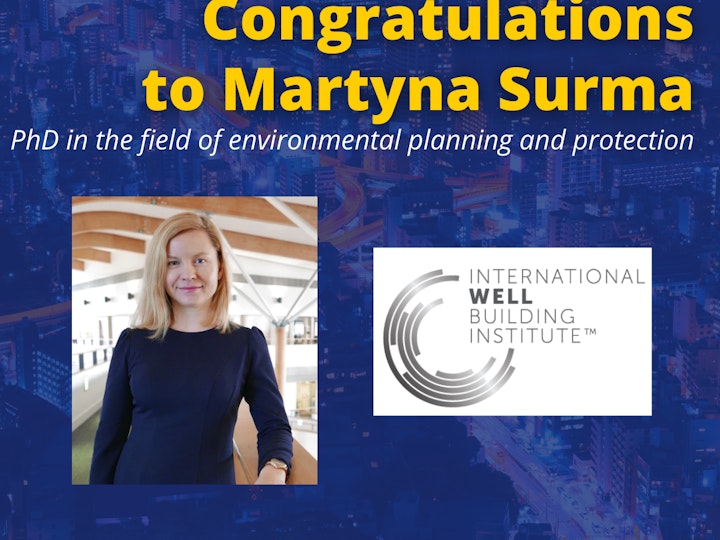Internship with the International WELL Building Institute
In early 2021, Martyna Surma completed a three-month internship with the International WELL Building Institute (IWBI) working on a joint academic-industry project: ‘Built Environment versus Employee Engagement in the context of the New Workplace Ecosystem in a Post-COVID-19 World’. We spoke with Martyna about her experience.

Can you tell us about the IWBI and how their work correlates with your PhD? Or how does their internship correlate?
The International WELL Building Institute (IWBI) is a global leader in providing both the real estate sector and office buildings’ occupiers with certification schemes focused on human health and well-being. The company is based in New York but currently operates in many locations worldwide (e.g., London). Their business approach comprehensively addresses the most recent interdisciplinary research across many fields (e.g., environmental psychology; occupational health; organisational psychology; and built environment) to develop standards for a healthy physical environment (or workplace). Given that my ongoing PhD research (supervised by Dr Richard Nunes and Dr Caroline Rook) at the Department of Real Estate and Planning is focused on the relationship between the built environment and employee engagement, the IWBI was a perfect business partner I could learn from as well as contributing to their research.
How did you receive the offer to complete the internship at the IWBI?
My internship at the IWBI was a direct result of the award Accelerating Business Collaboration granted by the Economic and Social Research Council in the United Kingdom and delivered via the University of Oxford. It was a competitive process and I am very honoured that our joint application with the IWBI has been successful.
What did the project consist of?
During my three-month virtual internship at the IWBI under the supervision of Dr Angela Loder (Vice President, Research) I elaborated a report providing insight into the industry metrics available on the global market and used for the workplace evaluation, and employee engagement metrics developed by academics in the field of organisational psychology. I elaborated a ‘matrix of metrics’ based on literature reviews, as well as the analysis of published approaches to post-occupancy evaluation by leading industry providers. Special emphasis was placed on a new workplace ecosystem scenario (e.g., home; office; and third places) to find possible research/business gaps emerging as a result of COVID-19 pandemic. Employee engagement is an important topic for both organisations as well as the real estate industry, providing design, evaluation, and management standards for the workplace. However, these metrics were designed specifically for the traditional office workplace environment. Given the projected switch of the global workforce to hybrid work patterns, there is a greater need now to adapt the existing metrics/tools to a new post-COVID-19 reality in a wider urban context.
How did you find working on a project that was so current (about COVID-19 as it’s happening)?
Working on a project which is directly linked with the COVID-19 pandemic is very challenging. From my research perspective, it creates an opportunity to think ‘out of the box’ about everything I have learned so far. It can be observed that successful adaptation to a new post-COVID-19 reality is a key concern for businesses nowadays. I am very grateful that I got a chance to make a small contribution to the global debate on the future workplaces and to employee engagement in this new context.
What is next for the report?
The report will be presented at a global seminar organised jointly with the IWBI, and the executive summary will be circulated among IWBI business partners. Additionally, I had the privilege to deliver an in-depth presentation of my report during the Joint Workshop Series on Sustainable Property Markets organised by The University of Tokyo (Center for Spatial Information Science) and The University of Cambridge (Cambridge Centre for Real Estate Research). The report is aimed to be published as one of my PhD research papers.
What lessons have you learned? Are there things you can apply to future projects?
My internship at the IWBI was a great experience and an excellent lesson of business collaboration. The most valuable for me during the internship was the opportunity to meet and learn from business people leading workplace-related research in the global industry sector. I appreciate their interest in my PhD project, as well as their contribution to the case study for London - the next step of my research investigation. The Accelerating Business Collaboration award significantly extended my expertise in the field and increased my network of professional contacts, which all can be applied to future projects as well.
Any other interesting takeaways from the experience?
Working on a joint academic/industry project is a very exciting process. However, it demands a willingness to collaborate among all of the parties involved. Additionally, I received help and support from my supervisory team.


